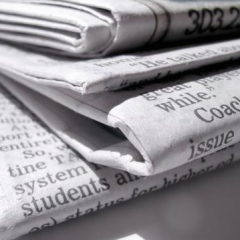Guardian's Sale of Regional Newspapers Indicates Lasting Change
First published at Outsell, Feb. 17, 2010
Important Details: The Guardian Media Group (GMG) has shed most of its regional newspaper assets, saying that its prime FGTrinity Mirror, the 10th largest newspaper company in the world, fourth largest in the UK and operator of 240 regional titles.
While Carolyn McCall, GMG’s CEO, said the chief goal was to preserve the flagship Guardian, Trinity Mirror CEO Sly Bailey talked about how the acquisition would extend reach across print and online, and is a further step towards “our strategic goal of creating a multimedia business of real scale.”
The purchase price was £44.8 million ($70.4 million), of which only £7.4 million ($11.6 million) was in cash. Trinity Mirror also released GMG from a £37.4 million print contract, accounting for the remainder of the value. Included in the transaction were the Manchester Evening News and 31 other regional titles published in the North-West of England, plus 10 titles in the south, including the Reading Post and the Surrey Advertiser. GMG’s Greater Manchester TV station, Channel M, and the local newspapers in Woking were not included in the deal. “Regional newspapers have been at the sharp end of digital disruption,” said McCall. “For us, it was a very small-scale business, it had 4% of the regional market and despite really important historic connections, it was set up to be a safety net, and it stopped being a safety net some years ago.” For the last reported year, GMG’s regional division made a profit of £500,000, down from £14.3 million in 2007-08.
McCall framed the decision to sell in the context of cost restructuring and the wider Guardian drive to build bigger digital businesses: “We have to control our costs. The Guardian’s cost base is too high for the future revenues of any newspaper. If we don’t get our cost base in order, someone else is going to do it for us. …Here we are with a profitable radio business, a profitable property services business, a fantastic business in Trader Media Group, and a robust and resilient business-to-business [group] in Emap. When you add all of that up, you get [a business worth] in excess of £1 billion even in a dire market, and we have £250 million of cash. We are not hard up.”
The low purchase price compared to values of six times and more for regional properties sold over the last two decades reflects the going-forward uncertainty of the marketplace, especially as to post-recovery advertising revenues.
Implications: The name Manchester immediately won the headlines, GMG’s flagship newspaper having been launched as The Manchester Guardian in 1821 before becoming The Guardian in 1959. The Evening News was “bought to sustain the Manchester Guardian and give it international wings,” Peter Preston, long-time editor of the Guardian, reminded his readers.
Clearly, though, newspaper companies have little time to shed tears for tradition, in the UK, the US or across the western world.
Outsell believes the sale points to two precious commodities in a time of seemingly permanent publishing change. Those commodities are familiar to humankind, but once of little historic familiarity to newspaper companies: money and time.
Money, of course, is now in short supply, with companies like Guardian News and Media (publisher of two national titles, the Guardian and the Observer) in the red, and Trinity Mirror struggling for profit as revenue declines in the mid-teens continued through 2009. That’s compared to 20%+ margins enjoyed by the newspaper industry worldwide four short years ago. Little cash flow and capital must be intensively managed, and hard choices made.
And time is running through the hourglass too quickly. Both Carolyn McCall and Sly Bailey are trying to transition their companies, on the fly, into more digitally oriented enterprises, and both are trying to use the stress of time to their advantage. For McCall, that means focusing news resources on the grand prize: the preservation of the self-described world’s leading liberal voice, the now-global Guardian, with only a third of its online readership in the UK, one-third in the US and one-third elsewhere (Outsell Market Report, UK News Companies Take New Aim at US Market: A Case Study in Going Global , Feb. 4, 2009).
The Guardian — an enterprise reliant on non-newspaper revenues to bolster its journalism — has long been considered a special case in publishing. Owned by the Scott Trust, set up in 1936 to secure the financial independence of the newspaper, it’s had the advantage of aiming for sustainable journalism rather than increasing profit. Even with that lineage, it’s noteworthy how much stress even that non-profit model is under. The company has made significant Guardian cuts in staff, including editorial, and expenses overall. Further, it has trimmed its Observer product set, all before disposing of the majority of its regional titles. Overall, McCall talks about losses being “massively reduced.”
As the leading news website (37 million unique visitors) in the UK, it is moving dramatically to embrace a more digital future. It is testing membership ideas, charging for its smartphone apps and reorganizing its print/digital ads around key niches and surpassing customer support. That’s where it wants to focus energy, time and money.
Similarly, Trinity Mirror, battered by the poor ad economy, has laid some foundation for the niched and regional multimedia future noted by Sly Bailey. Those plans include the launches of Mirror Football and 3am.co.uk, both in 2009 (see Insights 14 August 2009, Mirror Football Places Value Before Price) and the networking of its regional sites.
The newly acquired Guardian titles will double down on those strategies at a next-to-nothing purchase price. Yet a big challenge remains, even given the price – witness the recent bankruptcy filing of US-based MediaNews, which built its 55-strong title company on regional efficiencies.
The Guardian’s challenge parallels that of the New York Times. That legendary, 19th century-born newspaper bought regional properties as a means of adding growth, a strategy that worked well for decades. Now its regional newspaper group is also a drag on the company, its full-year 2009 revenue performance down 22.7 %, compared to the Times’ flagship performance, down a comparatively better 17.5%. The Times, too, has tested the market for its regional dailies, finding buyers for a few, but not yet for most. If the newspaper property market attains any sense of stabilization in 2010/2011, the Times, too, may take the route the Guardian just did, and with the same save-the-flagship rationale.




